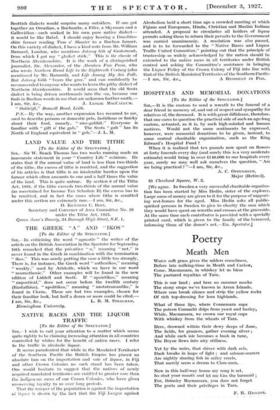THE GREEK " A " AND " TKOS "
[To the Editor of the SPECTATOR.] SIR; In criticizing the word " agnostic " the writer of the article on the British Association in the Spectator for September 10th remarked that the privative " a," meaning " not," is never found in the Greek in combination with the termination " ikos." This was surely putting the case a little too strongly, There is, for instance, the Greek word " asthenikos," meaning " weakly," used by Aristotle, which we have in our word " neurasthenic." Other examples will be found in the new edition of Liddell and Scott. If " apoietikos," meaning " unpoetical," does not occur before the twelfth century (Eustathius), " apolitikos," meaning " unstatesmanlike," is found in Cicero. These are but two examples, chosen for their familiar look, but half a dozen or more could be cited.—










































































 Previous page
Previous page